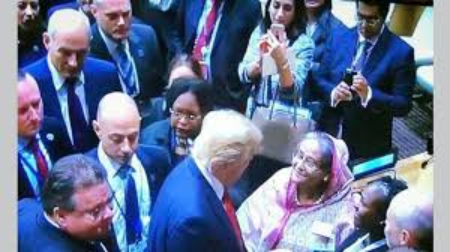US deputy secretary of state Stephen Biegun has told the Indian government that Washington will counsel it more on its neighbouring nations, as US makes a key stride towards resetting ties and links with Bangladesh at a gathering with Prime Minister Sheik Hasina on Wednesday. Biegun has arrived at Gonobhaban in Dhaka after a halt at New Delhi for the talks. It is a unique moment and chance as the USA is interested in knowing the current Indian perspectives on its South Asian neighbours while Bangladesh is interested in persuading the US to push for the repatriation of the Rohingyas to Myanmar.
Today’s US-Bangladesh interaction comes within weeks of India’s virtual meeting based dialogue with Bangladesh through the Joint consultative commission, in which Teesta river agreement and other major agreements on shared rivers were discussed.
Stephen Biegun will be the first important US high official to visit Dhaka in 10 years. As indicated by individuals acquainted with the issue, Biegun, in his conversations with Indian ambassador to the US, Harsh Shringla, went over approaches to reinforce the QUAD security discourse and looked for India’s contributions on its neighbourhood.
They talked about respective collaborations on an exchange basis, including the advancement of basic guidelines, a structure for speculations, aside from steps to enable the Indian subcontinent to respond to the Covid-19 pandemic, and plans to appropriate an immunization program when it is prepared.
Sources indicate that Shringla likewise advised his US counterpart on Bangladesh, and educated him concerning the requirement for Washington to set-up full-fledged relations with Bangladesh, a nation with a majority Muslim population in a time when it is rising financially under the current administration.
Previous US Secretaries of State John Kerry and Hilary Clinton had indicated their expectations to visit Dhaka, however, their plans did not see the light of the day. For a long time, India has urged the US to set up ties with Bangladesh under the initiative of Hasina, pointing out that the nation has moved past the hardliner attitude under Khaleda Zia.
This comes in the backdrop of China making immense advances into Bangladesh, with the last purchase of over 80% of the military equipment from Beijing, including cannons firearms, and ammo made by Hasina government. India in this regard had offered $500 million as a credit to Dhaka to purchase military equipment during Manohar Parrikar’s visit in 2018. The protection participation between the two neighbours is still a work in progress.
While the setting up of ties between US and Bangladesh can add to India’s benefit, some issues will still be contentious, like that of the displacement of Rohingyas, a substantial chunk of whom are in the slums in the Coastal Cox bazaar city in Bangladesh.





